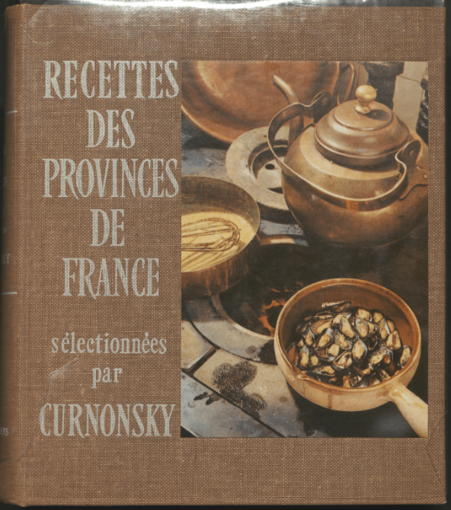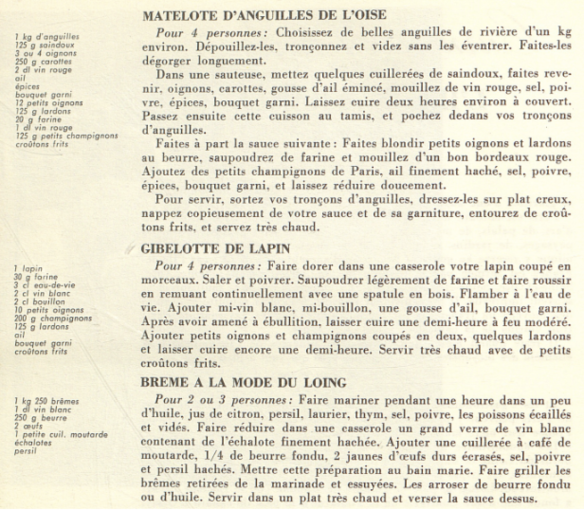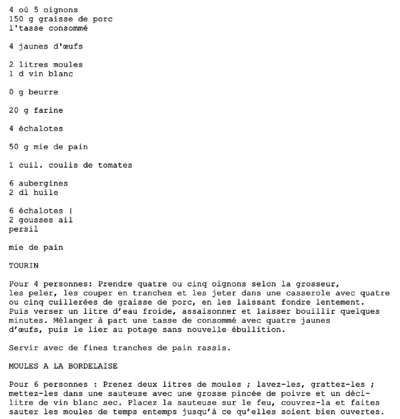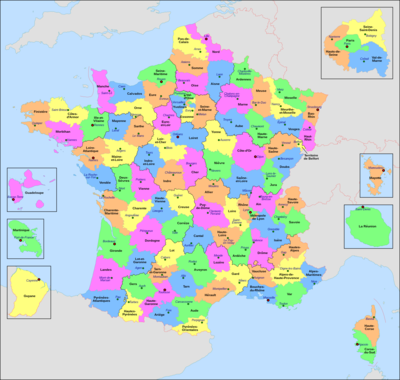France: Exploring Historical Cookbooks: Difference between revisions
Xiaotian.su (talk | contribs) |
|||
| Line 164: | Line 164: | ||
==Discussion and limitations== | ==Discussion and limitations== | ||
Like many other research, this project has its limitations. For example, in the data processing part, data analysis part, | |||
== Future work == | == Future work == | ||
Revision as of 16:43, 21 December 2022
Introduction
This project is an exploration of historical French cookbooks containing recipes from the 19th century. Through analyzing these cookbooks, we explore the most frequently used ingredients and food categories by region. We also examine the cooccurrence of ingredients and food categories.
Research questions
1. What were the main ingredients used in 1900 in France?
2. Can we observe a difference per region?
Project Plan and Milestones
| Date | Tasks | Completion |
|---|---|---|
| Week 3 |
Milestone 1: Project proposals
|
✓ |
| Week 4 |
|
✓ |
| Week 5 |
|
✓ |
| Week 6-7 |
|
✓ |
| Week 8-9 |
Milestone 2: Midterm presentation
|
✓ |
| Week 10 |
|
✓ |
| Week 11 |
|
✓ |
| Week 12 |
|
✓ |
| Week 13 |
|
✓ |
| Week 14 |
Milestone 3: Final presentation
|
✓ |
Methodology
Data digitalization
For a start, we scanned a physical French cookbook.
The we did a basic OCR for the scanned files. Here is a sample output from OCR. It is noticeable that there is a mismatch between recipes and ingredients.
Template output of the digitization
Data processing
In our project, we will extract the following information from the recipes:
- quantity: the amount of the ingredient
- unit: the metric of the ingredient
- ingredient: the entity appeared in the recipes
Units
- Spoons: 'cuil. à café', 'cuil. café', 'cuil. à soupe', 'cuil. soupe', 'petite cuil.', 'grande cuil.', 'cuil.',
- Glasses: 'petit verre', 'verre à liqueur', 'verres à liqueur', 'verres', 'verre', 'tasses', 'tasse',
- Bottles: 'bout.', 'bouteilles', 'bouteille',
- Containers:'g rande boîte', 'boîtes', 'boîte', 'tubes', 'tube',
- Spices & Aromatic plants: 'gousses', 'gousse', 'branches', 'branche', 'bâtons', 'bâton', 'pincée',
- Meat related: 'membres', 'membre', 'tronçons', 'tronçon', 'tranches', 'tranche',
- Standard measures: 'litres ', 'litre ', 'cl ', 'dl ', 'kg ', 'g ' , 'l'
Categories We map different ingredients to several major categories
- 'Viande': ['viande', 'oie', 'canard', 'oiseau', 'lard', 'bœuf', 'veau', 'poule', 'poulet', 'poularde', 'volaille', 'porc', 'caille', 'canard', 'caneton', 'mouton', 'cochon', 'coq', 'chevreuil', 'lièvre', 'levraut', 'lapin', 'faisan', 'gibier', 'jambon', 'chorizo', 'cervelas', 'agneau', 'escargot', 'grenouille'],
- 'Poisson': ['poisson', 'brochet', 'carpe', 'morue', 'lamproie', 'lotte', 'maquereau', 'omble', 'rouget', 'sardine', 'thon', 'truite', 'anchois', 'anguille', 'merlan', 'sole', 'barbue', 'turbot', 'raie', 'perche', 'saumon', 'colin', 'goujon', 'loup', 'congre', 'rascasse', 'grondin', 'merlu', 'merluza', 'hareng', 'alose', 'brême'],
- "Fruit de mer": ['crevette', 'langouste', 'moule', 'écrevisse', 'palourde', 'homard', 'chiperon', 'seiche', 'huître', 'coquille', 'poulpe'],
- 'Alcool': ['alcool', 'bière', 'vin', 'cidre', 'fine', 'liqueur'],
- "Plante aromatique": ["bouquet garni", 'ail', 'anis', 'aromate', 'angélique', 'basilic', 'persil', 'sarriette', 'cerfeuil', 'ciboule', 'ciboulette', "clou de girofle", "clous de girofle", 'girofle', 'cive', 'câpre', 'estragon', "feuille de vigne", "fines herbes", 'laurier', 'menthe', 'pissenlit', 'romarin', 'thym'],
- 'Epice': ['cannelle', 'coriandre', 'curry', 'safran', 'poivre', 'sel', 'moutarde', 'muscade', 'paprika', 'piment', 'sauge', 'serpolet', 'épices'],
- "Produit laitier": ['lait', 'crème', 'fromage', 'gruyère', 'parmesan'],
- 'Légume': ['artichaut', 'asperge', 'aubergine', 'bette', 'betterave', 'cardon', 'chou', 'cornichon', 'courgette', 'cresson', 'céleri', 'fenouil', 'légume', 'navet', 'panais', 'poireau', "pomme de terre", "pommes de terre", 'potiron', 'rave', 'salade', 'tomate', 'échalote', 'épinard'],
- 'Fruit': ['abricot', 'banane', 'cerise', 'coing', 'fraise', 'framboise', 'groseille', 'raisin', 'olive', 'orange', 'pomme'],
- 'Agrume': ['citron', 'cédrat', "fleur d'oranger", "fleurs d'oranger"],
- 'Céréale': ['farine', 'pain', 'pâte', 'riz'],
- 'Légumineuse': ['févette', 'haricot', 'pois'],
- 'Fruit sec': ['amande', 'noix', 'noisette'],
- 'Champignon': ['champignon', 'truffe', 'cèpe', 'girofle', 'morille', 'levure', 'oronge', 'duelle']
Region
We map subregions to 6 major regions in 19th century France.
- "Paris, Ile-de-France, Val de Loire": ['Paris', 'Ile-de-France', 'Orléans', 'Touraine'],
- "Pays de l’Ouest": ['Anjou', 'Bretagne', 'Poitou Vendée', 'Charentes'],
- "Sud-Ouest & Pyrénées": ['Bordelais', 'Gascogne', 'Pays Basque', 'Roussillon', 'Périgord', 'Languedoc'],
- "Sud-Est & Méditérannée": ['Provence', 'Nice', 'Corse', 'Dauphiné', 'Savoie', 'Lyon', 'Auvergne', 'Limousin'],
- "Bourgogne, Champagne, Bresse, Franche-Comté, Alsace, Lorraine": ['Bourgogne', 'Champagne', 'Bresse', 'Franche-Comté', 'Alsace', 'Lorraine'],
- "Nord & Normandie": ['Nord', 'Normandie']
Data analysis
Data visualization
Discussion and limitations
Like many other research, this project has its limitations. For example, in the data processing part, data analysis part,
Future work
- Build a search engine that would display the recipes and add filters to search them by name, region or ingredients
- User-friendly interface to visualize the results of the analysis
- Comparison with other cookbooks from different periods or different countries
Links
Github repository: Historical Cookbook



